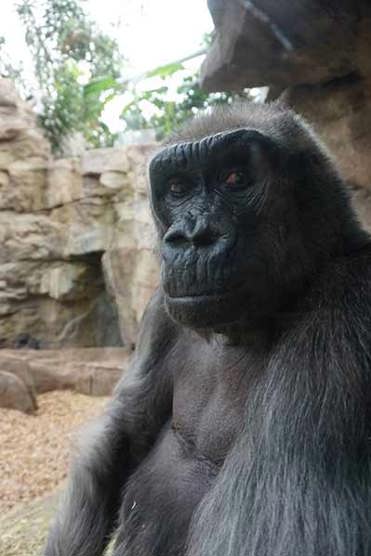Gorilla to undergo a follow-up exam at Franklin Park Zoo
Thursday May 2, 2019
|
UPDATE: May 3 Earlier today, Gigi, a 46-year-old western lowland gorilla, underwent a follow-up exam so that further diagnostics, including a CT scan, could be performed in the hopes of identifying the cause of recent health issues. The exam went smoothly and Gigi is recovering well from the anesthesia. Our veterinary team has a lot of data to review and samples that need to be analyzed before we will have more information to share about a diagnosis and treatment plan. The CT scanner for the exam was generously provided by Samsung NeuroLogica and we’re incredibly grateful to their fantastic team in assisting our staff to provide the best possible care. We would also like to thank Drs. Emily McCobb and Emily Wheeler, veterinary anesthesiologist and anesthesiology resident from Cummings School of Veterinary Medicine at Tufts University, and Dr. Jennifer Brisson, veterinary radiologist from Massachusetts Veterinary Referral Hospital, who assisted our team with today’s exam. Thank you to everyone who has sent well wishes and has been keeping Gigi and her care team in their thoughts. |

Gigi, a western lowland gorilla, will be put under anesthesia tomorrow at Franklin Park Zoo so the zoo’s veterinary staff can examine her and perform further diagnostics, including a CT scan, in the hopes of identifying the cause of recent health issues.
At 46 years old, Gigi is the oldest member of the gorilla troop at Franklin Park Zoo and among the oldest gorillas living within the North American population managed by the Association of Zoos and Aquariums. Gigi has been off-exhibit for the past few months due to ongoing health issues that have included a urinary tract infection and changes in energy, mobility and appetite.
Bloodwork obtained during an exam in late March revealed elevated biliary enzymes and elevated kidney values, both of which are generally non-specific as to cause, but could be indicative of an underlying issue with her gall bladder and kidneys. Further diagnostics, including the CT scan and a liver biopsy, will be performed to try to more specifically determine the cause of her recent health issues and abnormal laboratory values.
“The veterinary and animal care teams take extraordinary care of our geriatric animals to ensure that they enjoy a healthy and comfortable life as they age. While we have been able to closely monitor Gigi’s health through our well-established training program, tomorrow’s exam will provide a more comprehensive view of her overall health and may inform our care plans moving forward,” said Dr. Eric Baitchman, Zoo New England Vice President of Animal Health and Conservation. “We are incredibly grateful to NeuroLogica for so generously providing the CT scanner for this exam as this will assist our staff immensely in providing the best possible care.”
The CT scanner being used in Gigi’s procedure is NeuroLogica’s BodyTom®, the world’s first battery-powered, portable, 32-slice CT scanner.
“They told us the process of moving Gigi to an offsite hospital or imaging center was too complicated, so we brought the scanner to her,” says David Webster, Chief Operating Officer, NeuroLogica. “We’re honored to do it because this will keep Gigi safe and provide the veterinary team clear images so they can accurately diagnose Gigi and tailor their care accordingly.”
Whenever anesthesia is administered there is always a risk to the animal and people involved in the procedure.
“Any animal immobilization involving general anesthesia always carries some risk. We never enter into these procedures lightly and every possible effort is made to keep the animal, as well as the people involved in the procedure, safe and healthy,” said Baitchman.
The exam is expected to last at least three hours.
During her time off exhibit, her care staff is working diligently to monitor Gigi’s behavior, administer medications and work on improving her food consumption, while doting on her constantly with some of her favorite enrichment. Gigi’s favorite enrichment items include blankets, which she is often spotted carrying and making “nests” with, and food treats including banana peels, grapes, celery, oatmeal, escarole and yogurt – which her care staff have been using to help administer her medication. In addition to being an enjoyable snack, the yogurt also contains important probiotics, protein, and calories for Gigi.
Zoo New England is a proud, longtime supporter of conservation work on behalf of gorillas, including the Ape TAG Conservation Initiative, a collective effort by zoos to help conserve wild populations of endangered apes in their natural habitats. Habitat loss is among the major threats faced by gorillas. Recycling cell phones and other electronics reduces the need for additional coltan, a component of cell phones that is mined in central African forests right in the gorillas’ habitat. This, in turn, reduces the destruction of gorillas’ homes. Guests to Franklin Park Zoo can drop off their old cell phones, which are recycled through the Eco-Cell program.

